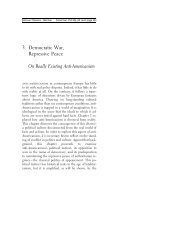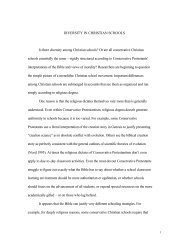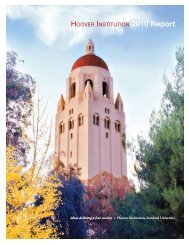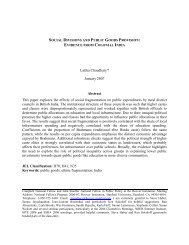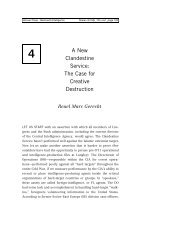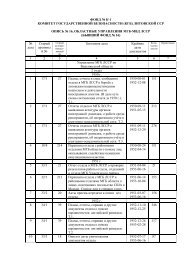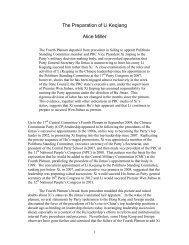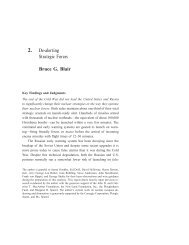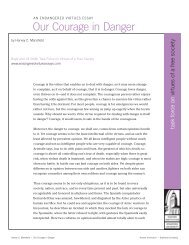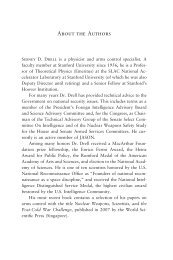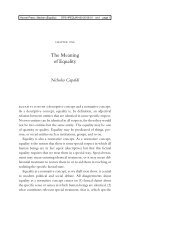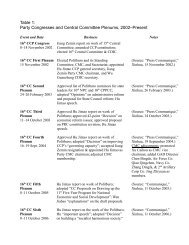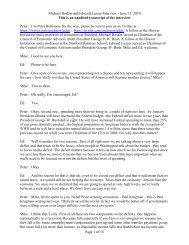Civil Liberties and Security in Cyberspace - Hoover Institution
Civil Liberties and Security in Cyberspace - Hoover Institution
Civil Liberties and Security in Cyberspace - Hoover Institution
You also want an ePaper? Increase the reach of your titles
YUMPU automatically turns print PDFs into web optimized ePapers that Google loves.
<strong>Hoover</strong> Press : Cyber DP5 HPCYBE0500 06-11-:1 11:53:04 rev1 page 204<br />
204 Ekater<strong>in</strong>a A. Drozdova<br />
privacy. The use of automated <strong>and</strong> semiautomated tools facilitates<br />
near-real-time detection of security breaches, trac<strong>in</strong>g to orig<strong>in</strong> of attack,<br />
scalability of action (detect<strong>in</strong>g <strong>in</strong>trusions among large volumes<br />
of data <strong>in</strong>volved <strong>in</strong> normal network operations <strong>and</strong> respond<strong>in</strong>g to<br />
<strong>in</strong>trusions that may hop across <strong>in</strong>ternational networks), <strong>and</strong> ultimately<br />
<strong>in</strong>creased efficiency <strong>and</strong> effectiveness. Automation <strong>in</strong> search<strong>in</strong>g, trac<strong>in</strong>g,<br />
<strong>and</strong> track<strong>in</strong>g preserves the anonymity <strong>and</strong> privacy of <strong>in</strong>nocent<br />
<strong>in</strong>dividuals whose messages may be subjected to search <strong>in</strong> the course<br />
of an <strong>in</strong>vestigation. The protection of privacy ultimately relies on a<br />
comb<strong>in</strong>ation of automated <strong>and</strong> other protective technologies as well<br />
as laws that constra<strong>in</strong> law enforcement. Where law enforcement methods<br />
are <strong>in</strong>trusive <strong>and</strong> automation is not available or fully reliable, legal<br />
constra<strong>in</strong>ts are especially necessary.<br />
3. Crim<strong>in</strong>al Law <strong>and</strong> Constra<strong>in</strong>ts<br />
on Police Behavior<br />
Constra<strong>in</strong>ts on police behavior <strong>in</strong> cyberspace have received far less<br />
public attention than privacy problems. This is partly because they are<br />
narrowly focused on crim<strong>in</strong>al <strong>in</strong>vestigation—whereas privacy <strong>in</strong>terests<br />
span personal, commercial, <strong>and</strong> government realms—<strong>and</strong> partly because<br />
what is necessary <strong>and</strong> legally permissible <strong>in</strong> cyber-related <strong>in</strong>vestigation<br />
<strong>and</strong> prosecution procedures is still be<strong>in</strong>g determ<strong>in</strong>ed.<br />
The protections aga<strong>in</strong>st self-<strong>in</strong>crim<strong>in</strong>ation <strong>and</strong> unwarranted<br />
searches <strong>and</strong> seizures <strong>and</strong> the rights to due process of law apply <strong>in</strong><br />
cyberspace as anywhere else, yet technological realities can complicate<br />
the observance of these rights. The pursuit of crimes committed over<br />
<strong>in</strong>ternational computer networks is also complicated by the differences<br />
<strong>in</strong> domestic procedures <strong>and</strong> the absence of a system of <strong>in</strong>ternational<br />
crim<strong>in</strong>al law.



